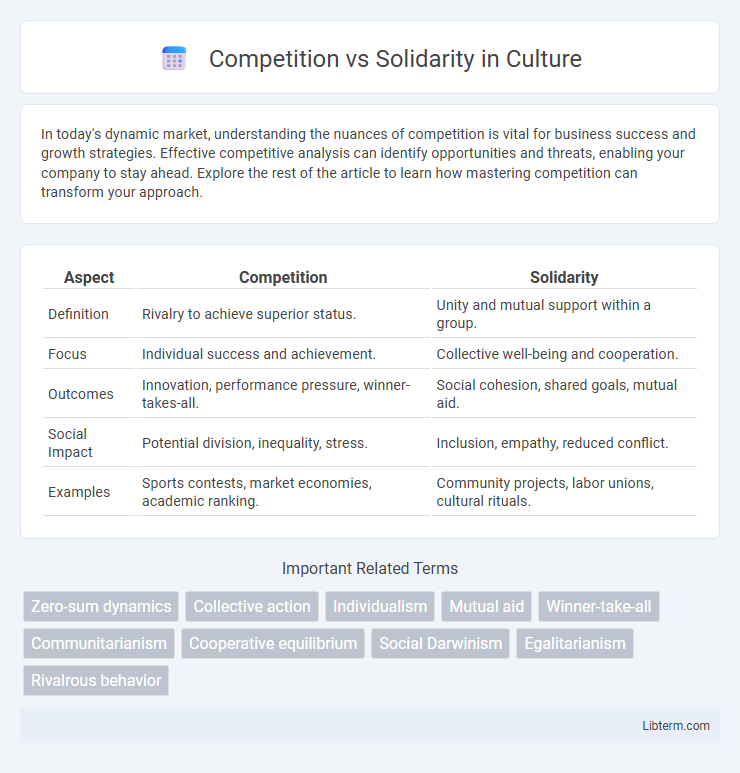In today's dynamic market, understanding the nuances of competition is vital for business success and growth strategies. Effective competitive analysis can identify opportunities and threats, enabling your company to stay ahead. Explore the rest of the article to learn how mastering competition can transform your approach.
Table of Comparison
| Aspect | Competition | Solidarity |
|---|---|---|
| Definition | Rivalry to achieve superior status. | Unity and mutual support within a group. |
| Focus | Individual success and achievement. | Collective well-being and cooperation. |
| Outcomes | Innovation, performance pressure, winner-takes-all. | Social cohesion, shared goals, mutual aid. |
| Social Impact | Potential division, inequality, stress. | Inclusion, empathy, reduced conflict. |
| Examples | Sports contests, market economies, academic ranking. | Community projects, labor unions, cultural rituals. |
Understanding the Concepts: Competition and Solidarity
Competition drives individuals or groups to achieve goals by outperforming others, fostering innovation and personal growth through rivalry. Solidarity emphasizes unity and mutual support within a community or group, promoting collaboration and shared goals to strengthen social bonds. Understanding these concepts highlights the balance between individual ambition and collective well-being in various social, economic, and organizational contexts.
Historical Perspectives on Competition vs Solidarity
Historical perspectives on competition versus solidarity reveal shifting societal values shaped by economic, political, and cultural contexts. In ancient guild systems and early communal societies, solidarity fostered mutual support and collective survival, whereas the Industrial Revolution emphasized competition as a driver of innovation and economic growth. Enlightenment thinkers debated the balance between individual self-interest and social cooperation, influencing modern theories on market economies and social welfare policies.
The Role of Competition in Economic Growth
Competition drives innovation by encouraging firms to improve products and reduce costs, leading to increased productivity and economic growth. It fosters efficiency as businesses strive to optimize resource allocation and outperform rivals in markets. The dynamic pressure from competition accelerates technological advancements and creates diverse consumer choices that stimulate expanding economies.
Solidarity as a Force for Social Well-being
Solidarity fosters social well-being by promoting collective support and shared responsibility within communities, enhancing resilience during crises. It encourages collaboration, reduces social inequalities, and strengthens social bonds, leading to improved mental health and societal cohesion. Empirical studies show that communities with higher levels of solidarity experience lower crime rates and better overall quality of life.
Advantages and Disadvantages of Competitive Societies
Competitive societies foster innovation and efficiency by encouraging individuals to strive for excellence and outperform rivals, leading to economic growth and technological advancements. However, such societies often experience increased stress, social inequality, and reduced collaboration, as the emphasis on personal success can undermine community support and shared goals. The resulting divide between winners and losers may lead to social fragmentation and hinder collective well-being.
Strengths and Limitations of Solidarity-Based Communities
Solidarity-based communities foster collective support and shared resources, enhancing social cohesion and resilience during crises. Their strengths include promoting inclusivity and mutual aid, which can reduce social inequalities and strengthen communal bonds. Limitations involve potential challenges in scalability and decision-making efficiency, as consensus-driven processes may slow responses in urgent situations or diverse groups.
Global Case Studies: Balancing Competition and Solidarity
Global case studies reveal diverse approaches to balancing competition and solidarity, such as the European Union's Single Market promoting economic competition while ensuring social cohesion through policies like the European Social Fund. In contrast, the Nordic model emphasizes solidarity by combining competitive markets with robust welfare states that guarantee universal healthcare and education. Emerging economies like India showcase efforts to foster competition-driven innovation alongside community-based programs aimed at reducing inequality and enhancing social solidarity.
Competition vs Solidarity in the Workplace
Competition in the workplace drives employees to exceed performance targets, fostering innovation and efficiency, but often increases stress and reduces collaboration. Solidarity encourages teamwork, shared goals, and mutual support, enhancing morale and collective problem-solving while potentially slowing individual achievement. Balancing competition and solidarity is crucial for creating a dynamic yet cohesive work environment that maximizes productivity and employee satisfaction.
Fostering Cooperation in Competitive Environments
Fostering cooperation in competitive environments enhances innovation and productivity by encouraging knowledge sharing and collective problem-solving among participants. Balancing individual incentives with team-oriented goals creates a culture where competition drives performance without undermining collaboration. Strategies such as collaborative goal setting, transparent communication, and mutual recognition promote solidarity while maintaining healthy competition.
Towards a Harmonious Future: Integrating Competition and Solidarity
Integrating competition and solidarity fosters a balanced environment where innovation thrives alongside mutual support, driving sustainable growth and social cohesion. Emphasizing collaborative competition encourages individuals and organizations to strive for excellence while maintaining empathy and shared goals. This synergy between competitive spirit and solidarity is essential for building resilient communities and achieving long-term prosperity.
Competition Infographic

 libterm.com
libterm.com